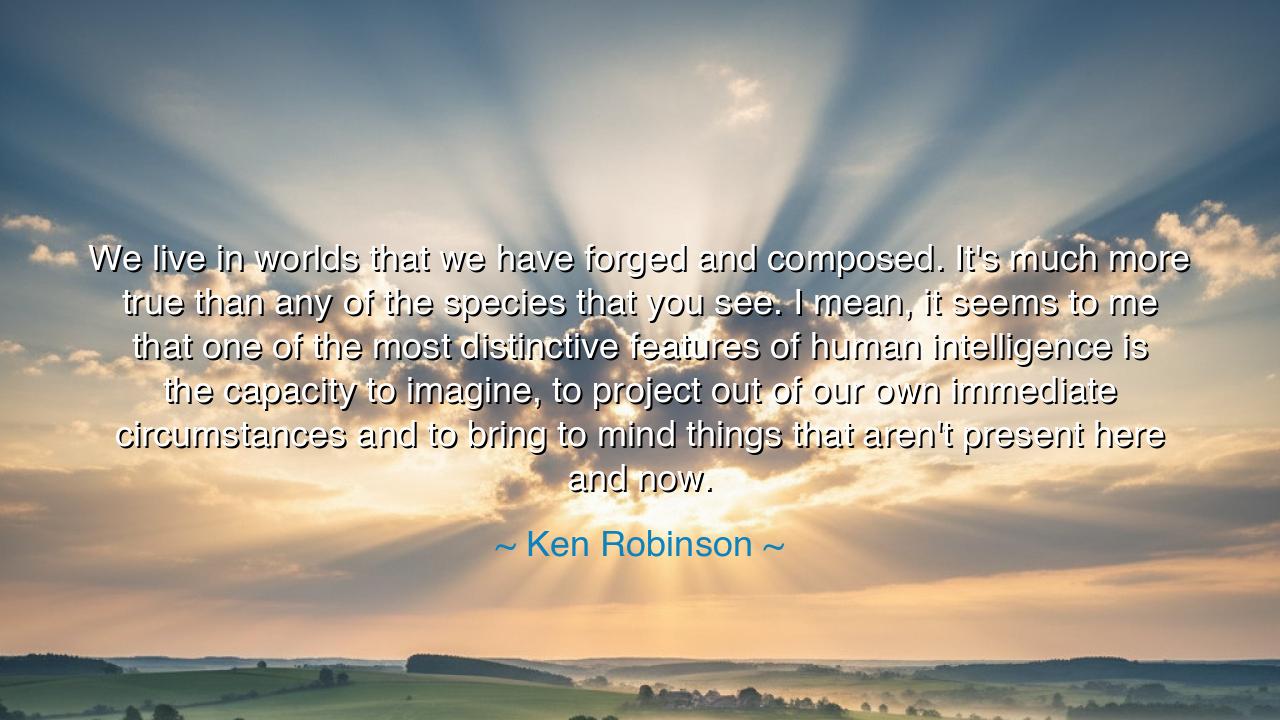
We live in worlds that we have forged and composed. It's much
We live in worlds that we have forged and composed. It's much more true than any of the species that you see. I mean, it seems to me that one of the most distinctive features of human intelligence is the capacity to imagine, to project out of our own immediate circumstances and to bring to mind things that aren't present here and now.






The wise teacher and visionary Sir Ken Robinson, whose life was devoted to awakening the creative spirit of humankind, once said: “We live in worlds that we have forged and composed. It's much more true than any of the species that you see. I mean, it seems to me that one of the most distinctive features of human intelligence is the capacity to imagine, to project out of our own immediate circumstances and to bring to mind things that aren't present here and now.” In this profound reflection, Robinson gives voice to one of the most sacred truths of human existence — that we are not merely creatures of instinct or circumstance, but creators of worlds. We live not only in the physical realm, but in the vast and invisible kingdoms of imagination, where our thoughts shape the destiny of our kind.
For Ken Robinson, this truth was not born in abstraction, but in his lifelong observation of education, art, and the human spirit. He saw that imagination — that divine spark of thought which envisions what does not yet exist — is the defining power of humanity. Animals live within the boundaries of their environment, bound by instinct and necessity. But man, that strange and dreaming creature, lives also in the world of possibility. He builds cathedrals from faith, empires from vision, and futures from dreams. He can stand in the dust of the earth and imagine the stars; he can look upon chaos and compose order. This, Robinson teaches, is not a gift to a few — it is the birthright of all.
In the ancient days, the philosophers of Greece spoke of logos — the divine reason, the creative principle that brings form from the void. Robinson’s insight is an echo of that wisdom, renewed for the modern age. To imagine is to exercise this sacred faculty; to project beyond the present is to wield the same power that shaped civilization itself. Consider how the great inventor Leonardo da Vinci, centuries before the age of flight, sketched machines that would one day soar through the heavens. Or how Copernicus, gazing at the night sky, dared to envision a universe not centered on man, but on the sun. These men did not simply observe the world — they forged and composed new worlds through thought. Their minds traveled where their bodies could not yet go, and the world itself followed in their footsteps.
And yet, Robinson’s words are also a quiet warning. For if we are capable of creating worlds, we are also capable of forging prisons. The same imagination that dreams of beauty can build systems that confine it. Too often, our institutions — schools, governments, cultures — have forgotten the very gift that made them possible: creativity. We have trained generations to repeat rather than to imagine, to obey rather than to question. Thus, we have built worlds that mirror our fears instead of our hopes. Robinson’s mission was to remind us that the human mind, left free to dream, is not a problem to be solved but a power to be unleashed.
Consider the story of Nelson Mandela, who, imprisoned for twenty-seven years, lived within a world no larger than his cell — and yet his mind roamed free. He imagined a South Africa reborn in unity and justice, and that vision sustained him. When at last he emerged from captivity, he did not step into a world he had found, but one he had forged within himself. Such is the power of imagination: it transcends circumstance, it defies despair. Even in the darkest confinement, the human spirit remains a creator of light.
Robinson’s insight, then, is both exaltation and exhortation. He reminds us that to be human is to be an artist — not merely of paint and stone, but of thought, of meaning, of existence itself. We shape our own realities through the stories we tell, the values we hold, the dreams we pursue. The civilizations of the earth — every city, every monument, every melody — began first as an image in the human mind. We are the only species that can imagine what is not yet, and through that vision, make it real. To forget this is to lose the very essence of our humanity.
So let the lesson of Ken Robinson be this: guard and nurture your imagination, for it is the forge of your future. Do not live merely in the world you see; dare to live in the world you can create. When your circumstances seem narrow, let your mind travel beyond them. When the world seems broken, compose a better one within your heart. And when others tell you to be realistic, remember that every reality was once a dream — a vision summoned by someone who refused to accept what was.
For in the end, the power of man lies not in strength or survival, but in this sacred faculty — the power to dream beyond the present, to forged and compose worlds from the unseen. Use it well, and you will not merely exist; you will participate in the divine act of creation. For imagination is not escape — it is evolution, the bridge between what is and what could be. And through it, humanity will forever rise beyond its circumstances, and reach toward eternity.






AAdministratorAdministrator
Welcome, honored guests. Please leave a comment, we will respond soon